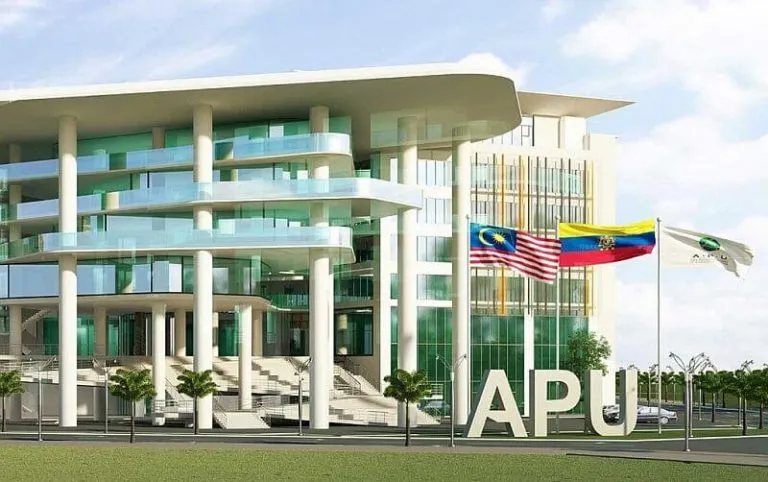Why choose APU?

Dual Degree
APU-DMU Dual Degree Programme
Requirements
Admission Requirements
- 3 Credits in at least 3 subjects at SPM level including Mathematics and any Science Subject (Science, Physics, Chemistry, or Biology) with a minimum of a pass in Bahasa Malaysia, Sejarah (History) and English;
- 3 Credits (Grade C & above) in at least 3 subjects at IGCSE/ O-Levels including Mathematics and any Science Subjects (Science, Physics, Chemistry, or Biology) with a minimum Pass in English at SPM/ O-Level/ IGCSE;
- 3 Credit (Grade B & above) in at least 3 subjects in UEC including Mathematics and any Science subject (Science, Physics, Chemistry, or Biology) with a Pass in English;
- Pass Sijil Tinggi Persekolahan Malaysia (STPM) or its equivalent with a pass in Mathematics, English and ONE (1) relevant science/technical/vocational subject at the SPM level;
- Recognised Certificate in Engineering/Engineering Technology or its equivalent;
- Recognised related Vocational and Technical/ Skills Certificate or its equivalent with ONE (1) year of relevant work experience or a minimum of ONE (1) semester of a bridging programme;
Any qualification that APU accepts as equivalent to the above.
Note: The above entry requirements may differ for specific programmes based on the latest programme standards published by Malaysian Qualifications Agency (MQA). The qualification and entry requirements for the programmes will be determined based on the “Comparison List of Equivalency of International Qualifications with SPM (O-Levels equivalent) and STPM (A-Levels equivalent)” published by Malaysian Qualifications Agency (MQA).
- IELTS : 5.0
- TOEFL IBT : 40
- Pearson (PTE) : 47
- MUET : Band 3.5
Programme Outline
What We Teach
This APU Diploma in Mechatronic Engineering is designed to provide:
- Knowledge, skills and attributes enabling them to develop a broad understanding on well defined challenges in the engineering industry in accordance with the Dublin Accord.
- Industrial training is incorporated into the syllabus to enable a generation of future proof aspiring engineers.
- Soft skills which include communication skills, teamwork and life-long learning skills which remain pertinent to the resolution of challenges encountered today and in the future are provided.
- Students with academic and professional skills to develop solutions requiring a holistic yet innovative outlook in mechatronics engineering.
- Students with opportunity to progress seamlessly into degrees recognized by the Washington Accord in relevant areas and a Masters in Engineering from the United Kingdom.
-
Semester 1
In the first semester, students will be taught Instrumentation focusing on control processes that use sensory technology. The Circuit Analysis module explains and finds out the current and voltage in each element of a network using Kirchhoff’s law, network theorems and nodal and mesh analysis. Software based Engineering drawing will also be introduced to complement manufacturing of product.
Modules
- Instrumentation
- Fundamentals of Engineering Mathematics
- Circuit Analysis
- Engineering Drawing
Semester 2
Continuation from semester 1; students study Mathematics in more depth. The Analogue Electronics module aims to introduce student to analogue circuits and its analysis. In addition, programming knowledge of the student is enhanced through Python.
Modules
- Engineering Mathematics 1
- Analogue Electronics
- Programming with Python
Semester 3
In semester 3, students will continue studying Mathematics. They would also learn the fundamental principle of logic circuits and their applications in digital system. Student are also exposed to number systems, Boolean algebra and Karnaugh map techniques to construct simplified digital circuits, latches, flip flops and simple asynchronous and synchronous counters.
Modules
- Engineering Mathematics 2
- Digital Electronics
Semester 4
From semester 4 onwards, students are introduced to material science and robotics. Material science is used to apply the basic principles of chemistry and physics to understand the structure and properties of materials which is crucial when designing systems. Robotics deals with the design, construction, operation, and use of robots and computer systems for their control, sensory feedback, and information processing. Students could create their own robots using the knowledge they gained.
Modules
- Material Science
- Robotics
Semester 5
Two of the modules in semester 5 involves programming languages. Students are also exposed to Industrial management, safety, and ethics. Entrepreneurship module prepares students for developing a mindset for thinking creatively using innovation, recognising opportunities, and generating entrepreneurial ideas.
Modules
- Thermo-Fluids
- Fundamentals of Entrepreneurship
- Problem Solving and Programme Design Using C
Elective 1
- Applied Mechanics
- Fundamental of Petroleum Engineering*
Elective 2
- Microprocessor Systems
- Petroleum Geochemistry*
Semester 6
In semester 6, Mechatronics students use CAD software to analyse complex mechanical, electronic, or other engineering systems. Thermo-fluid module combines coverage of basic thermodynamics, fluid mechanics, and heat transfer which remain fundamental in maintaining a high efficacy of production processes and in the subsequent design of products or systems.
Modules
- Computer-Aided Design & Manufacturing
- Industrial Management, Safety and Ethics
- Engineering Project
Elective 3
- PLC and Pneumatics
- Elements of Reservoir Rock and Fluid*
Elective 4
- Systems and Control
- Petroleum Geology*
Semester 7 – Internship (16 weeks)
Students will undertake an Internship/Industrial Training for a minimum period of 16 weeks to prepare them for a smooth transition from the classroom to the working environment.
PETROLEUM EXPLORATION SPECIALISM*
Student who intended to pursue Bachelor of Engineering in Petroleum Engineering with Honours in the future will need to take the modules with (*) as electives.
*In addition to the above, all students are also required to successfully complete General Studies modules as stipulated by the Malaysian Qualification Agency, as well as fulfill credit requirements for Co-curricular Activities.
Further Studies
Upon successful completion of this programme and fulfilment of requirements for credit transfer, you will be eligible to progress into Level 2 of the following degree programmes offered at APU.
- Bachelor of Electrical and Electronic Engineering with Honours
- Bachelor of Mechatronic Engineering with Honours
- Bachelor of Mechanical Engineering with Honours
- Bachelor of Computer Engineering with Honours
- Bachelor of Petroleum Engineering with Honours
For the full listing of our Diploma Programmes, please refer to the Pre-University programme brochure.














